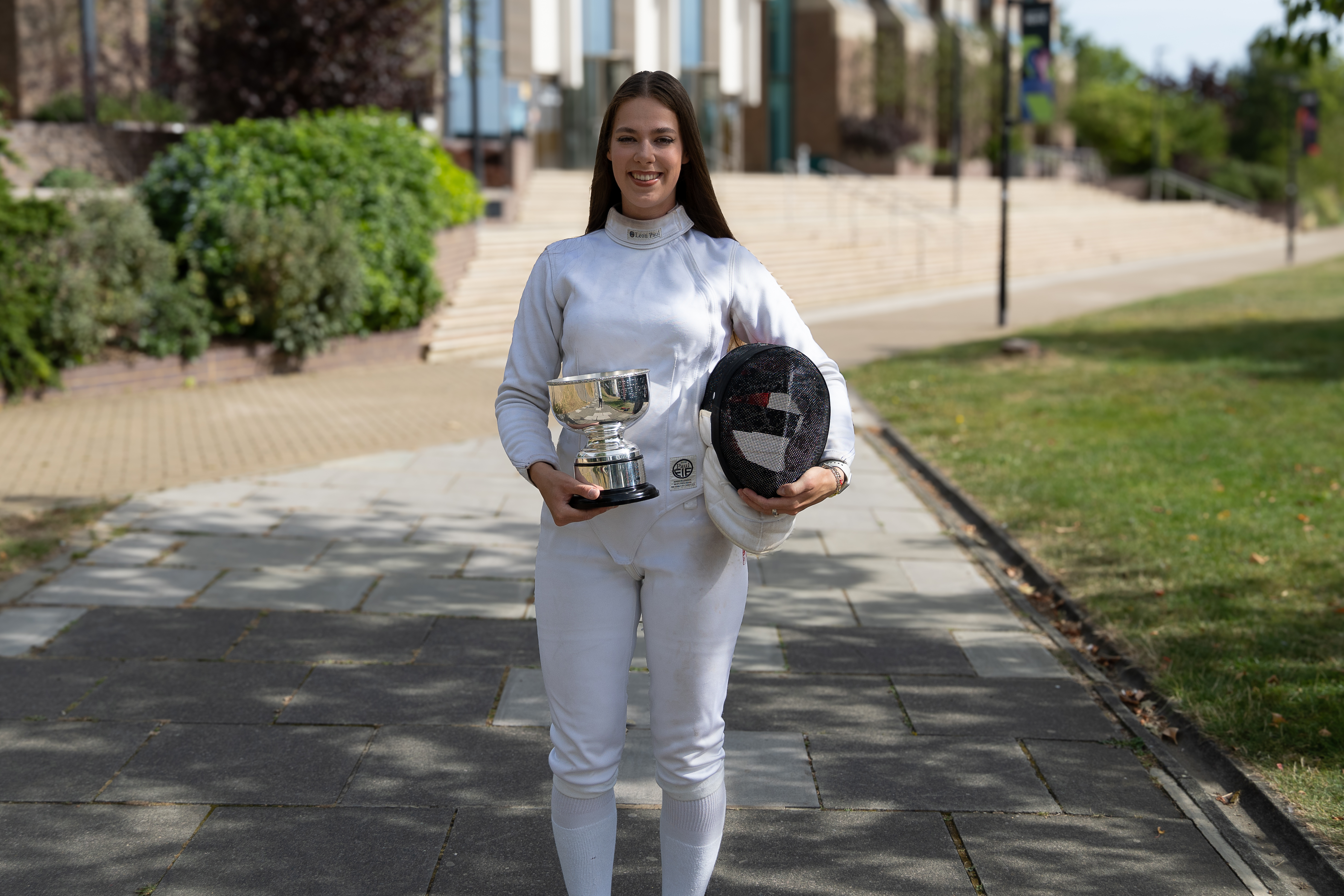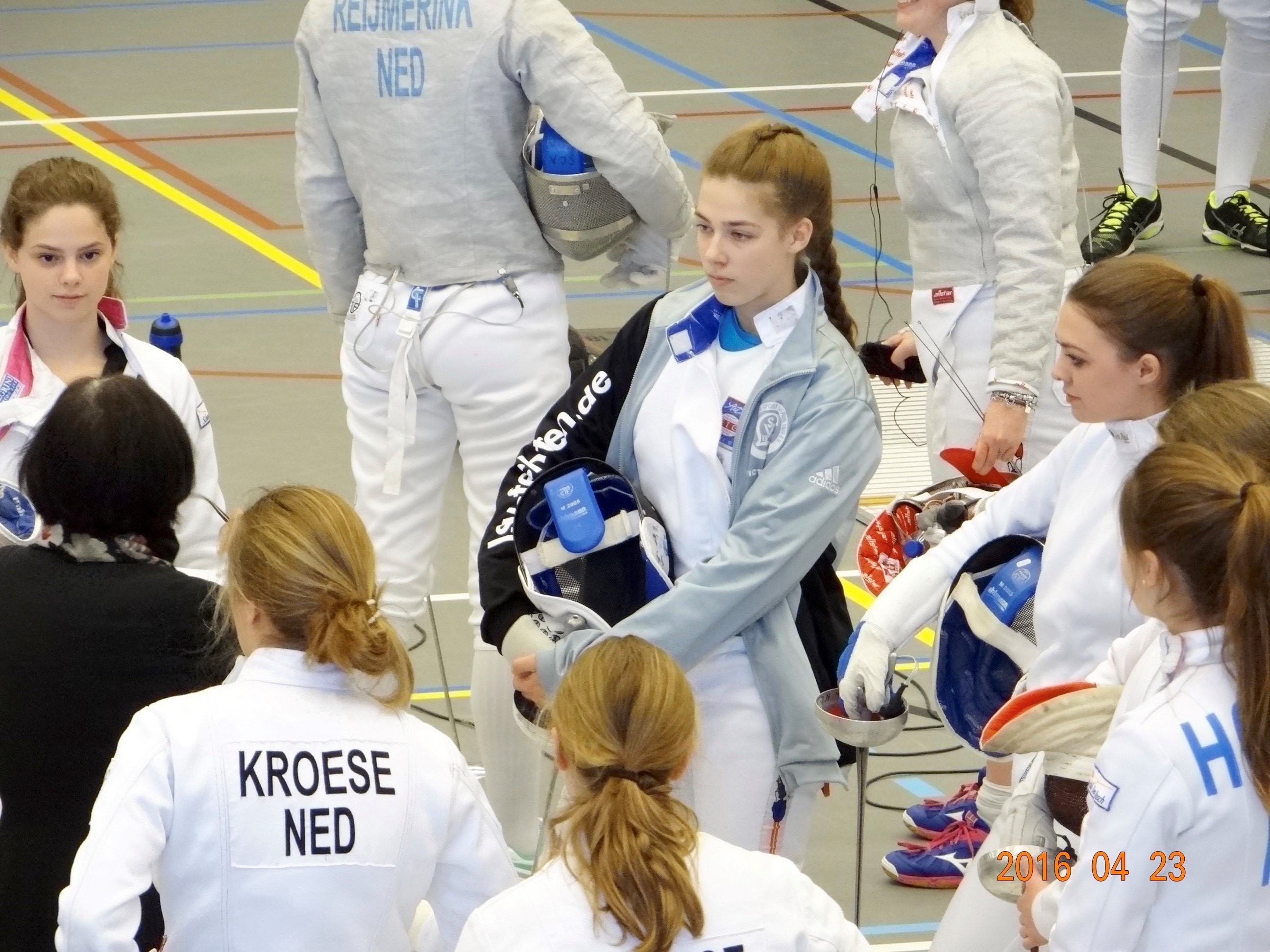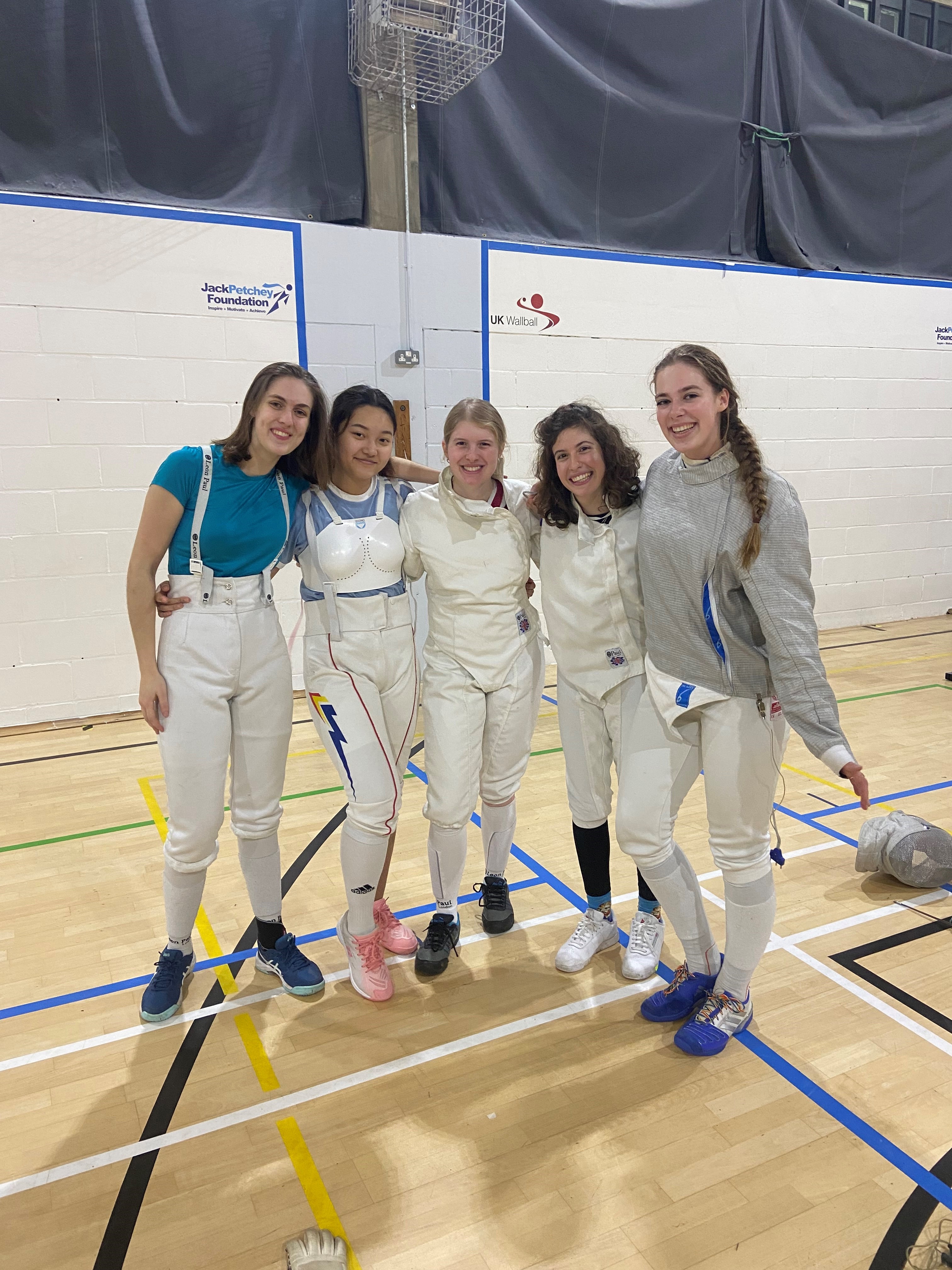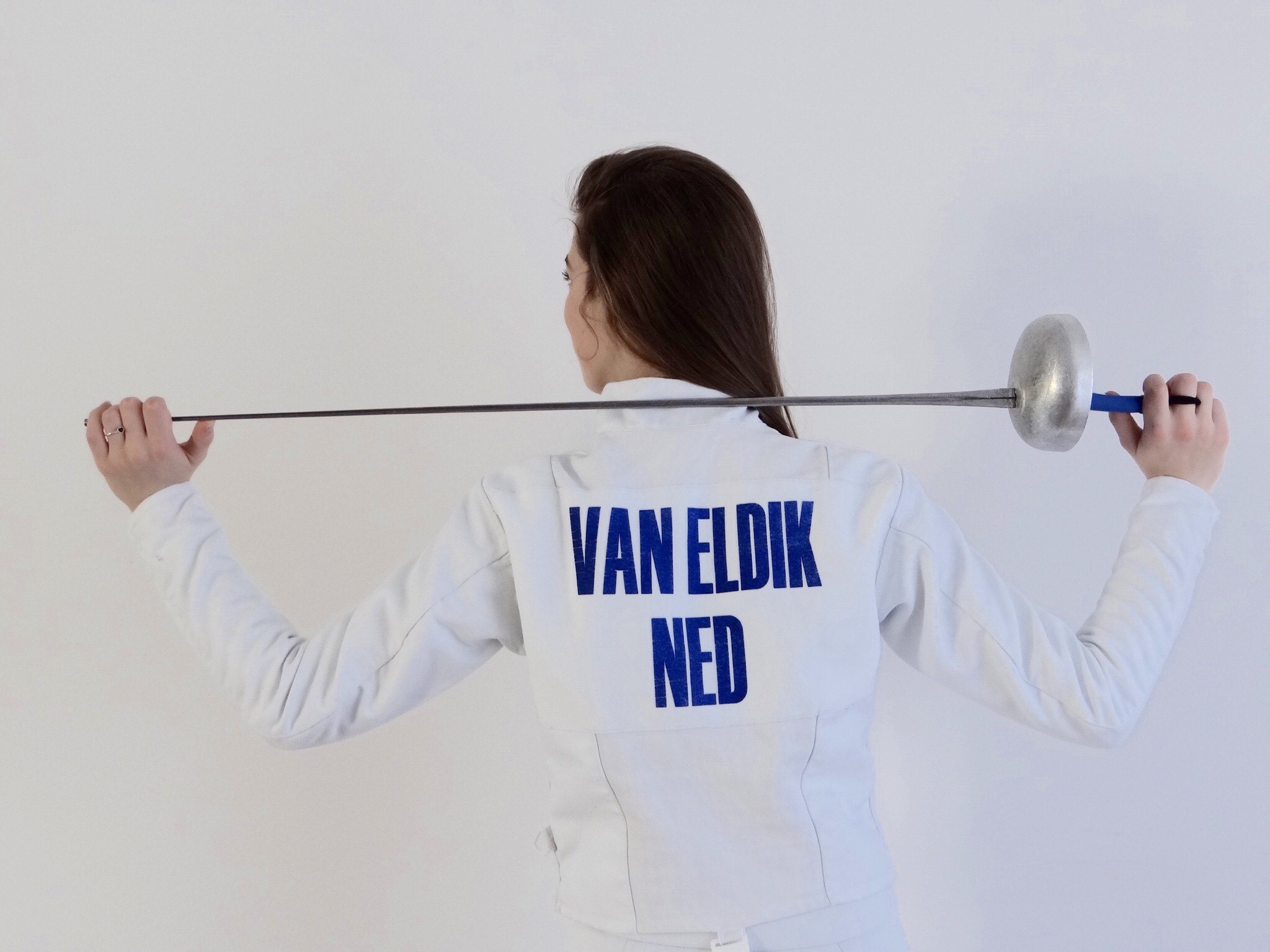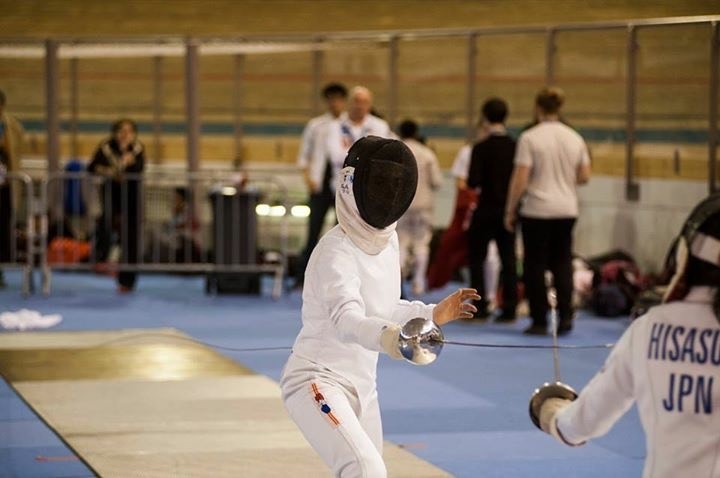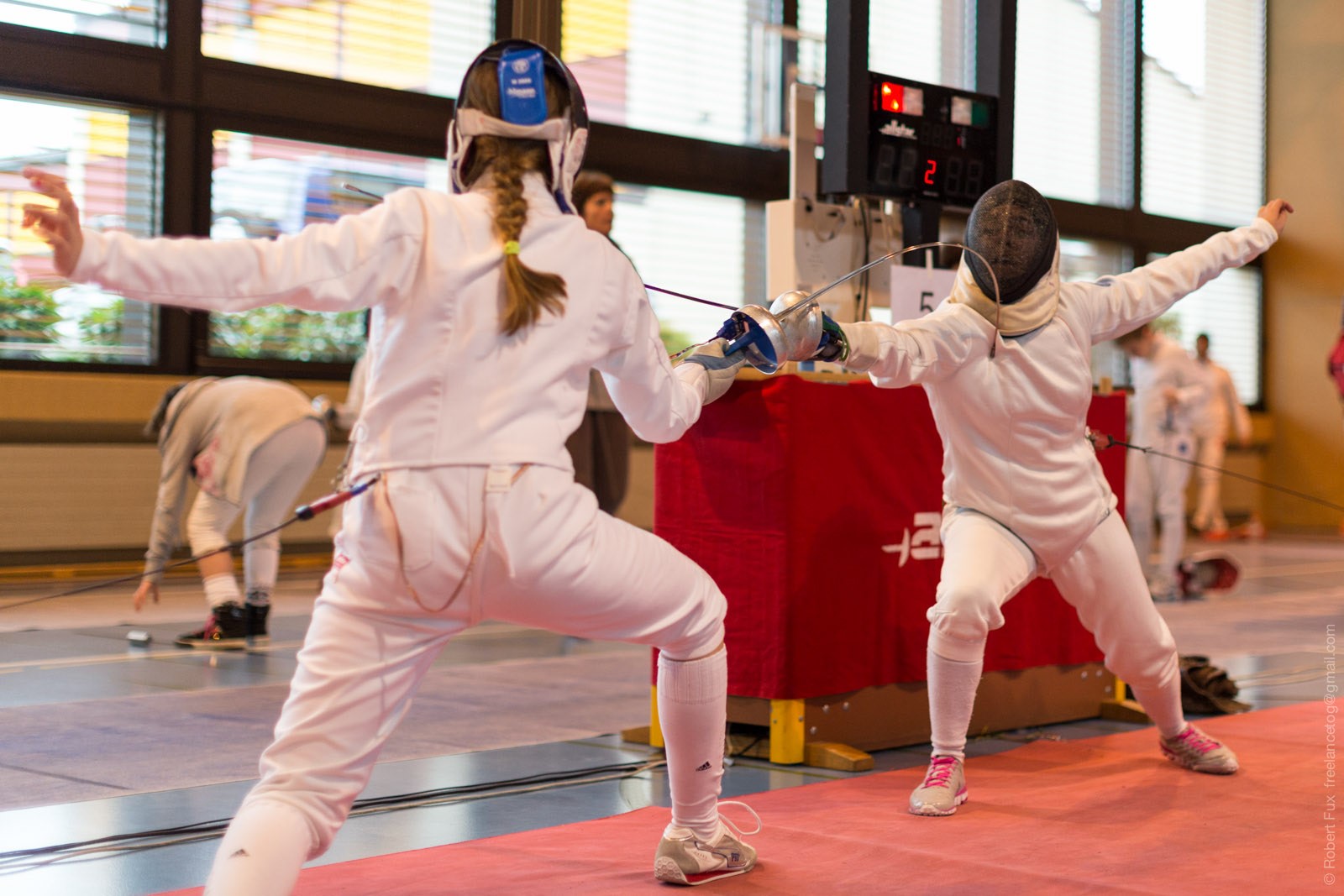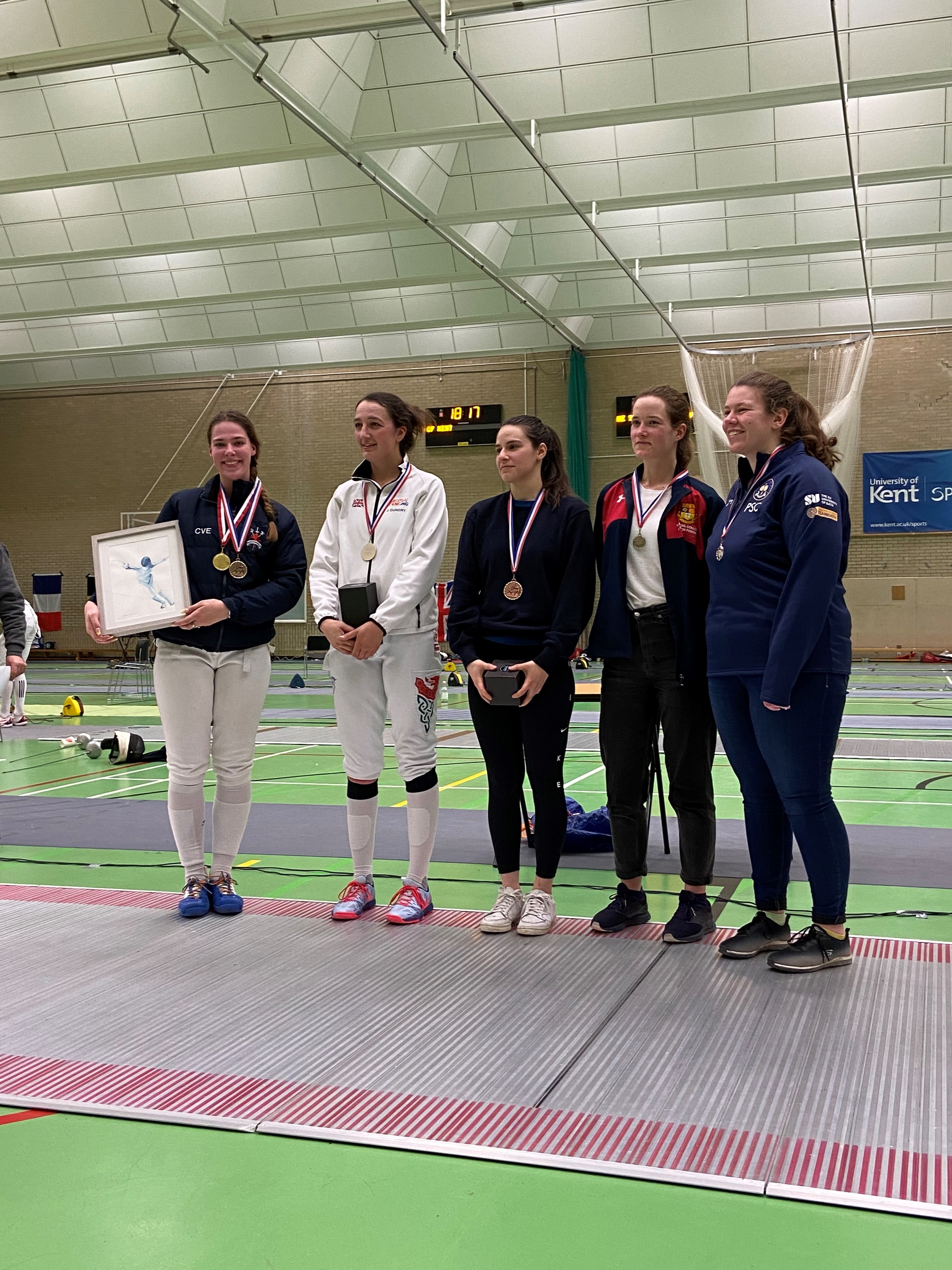Each year, during the Scholarship celebration evening, we award one of our incredible Scholars the title of ‘Scholar of the Year’. This award is in recognition of their commitment to the scheme, their sport, and the University on the whole. For the 2023/24 academic year Kent Sport chose Fencing Scholar Caroline van Eldik, for her commitment to the scheme and dedication to her sport. Here we dive deeper into her experience of the scheme and of the University of Kent.
You have been part of Kent University firstly as an undergraduate student before working at Kent Union for two years and then most recently completed your Masters, can you detail your academic courses during your time at Kent?
I came to Kent in 2018 to study for an undergraduate degree in international business. My degree was fantastic! I had some really great lecturers who supported me throughout my first three years, and I enjoyed all of my modules! When I decided I wanted to do a Masters, staying at Kent was a no-brainer. I chose to continue with International Business and Management because I had such a positive experience with the business school during my undergrad. The Masters was definitely a tough one but now that I have finally completed it I am so proud of myself and I can’t wait to graduate in November.
Following the completion of your Masters is this your final leg at the University and if so, what are your plans after you graduate this summer?
I have secured myself a job as a Domain Knowledge Expert for a tech company called Instapro Group. I will be starting my new job in September and I’m really looking forward to it. I will be staying in Canterbury because I get to work from home! So I plan to continue to use Kent Sport and contribute to the Fencing club as a coach for the women’s team.
Given the two-year gap between completing your Undergraduate Degree and Masters, can you comment on the differences in studying at each level and the challenges of studying whilst also meeting your Scholar expectations?
While completing my undergraduate degree came with its own challenges, studying for my Masters was notably more demanding! Throughout my undergraduate degree, I developed the necessary time management skills to balance my degree, my sport, and my social life. When I returned for my masters I felt like I was equipped with the necessary skills to succeed academically and meet the expectations of the scholarship scheme. During my Masters, I also worked two part-time jobs which was a struggle at times!
Can you comment on your hometown of Lisse in the Netherlands but also the other countries you have called home and formed part of your heritage growing up?
I was born in the Netherlands. When I was 9 years old, my family moved to Switzerland for my dad’s job. In Switzerland, I was first introduced to fencing! There was a club close to my new school and my mum suggested I should try it. Previously I had been a competitive gymnast, so this was quite a big change but we couldn’t find a gymnastics club nearby so fencing had to do! I had two fantastic years in Switzerland during which I fell in love with the sport, and also got to meet people from all sorts of cultures and backgrounds which was so exciting to me! Then we moved to Germany where I completed high school. We were lucky to find another fencing club where I was able to continue my sport.
How did you first hear about Kent University and what attracted you to come to study here and how did you first hear about any Sports Scholarship opportunities?
A lot of my highschool friends were looking to study in England and I thought that would be a great idea for me too. I chose Kent because it is one of the closest universities to mainland Europe (my family) and Canterbury was such a beautiful city. The most important thing to me was choosing a place where I could see myself feeling at home. I heard about the scholarship scheme through my friends at the fencing club, our president at the time was a scholar, and he was someone I looked up to a lot. In my second year I applied for the scheme and it was one of the best decisions I’ve ever made!
Can you remember your very first week on Campus and your experience arriving at University as an international student?
My first week on campus feels like ages ago now! I remember feeling excited to be a part of all the action! Welcome Fair is one of the only things I can remember now. Before coming to the UK I was looking at the Kent Union website to see all the societies the university had to offer and I remember making a list of the ones I was interested in. So seeing the societies at Welcome Fair was definitely a highlight, and I recall the fencing club welcoming me with open arms because they were so excited to find an experienced fencer!
When did you first engage with the Fencing Community at the University and how established was the Club when you first arrived at Kent?
The fencing club was one of the main reasons why I chose to study at kent. I had done some research and found that the club had won Club of the Year at Kent Union’s Team Kent ball awards and I was immediately interested to find out more. I knew that I wanted to continue fencing at university and joining a good club was a priority for me. I found the club during Welcome Fair, joined them there and then, and the rest is history.
Can you provide a short summary of the growth of Fencing at Kent during your time here bringing us right up to date with the success of the women’s team in BUCS during the 2023/24 season?
Where to start! One of the selling points for Kent for me personally was seeing that the fencing club had won sports club of the year, the year prior to me joining the university. This gave me the impression that the club was well organised and successful and that was important to me. During my first year in the club we had an incredibly successful BUCS season seeing numerous teams being promoted and I was so excited to be a part of it all. Then Covid brought some huge challenges, which we were able to overcome as best as we could, and in my opinion, we bounced back really quickly! The committee has always been brilliant and is one of the main reasons the club has been able to thrive these last 6 years! We were able to introduce a women’s second team for the first time in the history of the club which was one of my proudest achievements as women’s captain, and recently the club has flourished with our new coach! I can’t wait to see what this year’s committee has in store!
What do you think is the best thing about the community and student life in Canterbury at Kent University?
My favourite thing about community and student life at kent is that there is a society/sport club for everyone! We have such a beautifully diverse range of societies that cater to lots of niche interests. This gives our students the opportunity to find a group of friends with whom they can share their interest and passions, and feel a sense of belonging.
Fencing is a very traditional sport but one that might appear confusing to an outsider, can you provide a summary of the different formats and competition and detail which events students compete in with BUCS?
Fencing is a sport that is divided into three weapons: Epee Foil and Sabre. Whereas the objective, to hit your opponent more than they hit you, is the same in all three weapons, the rules are different for each of them. The most obvious differences are the target area where you can hit your opponent and the type of weapon you use. Fencing is an individual sport but can also be done as a team. At BUCS weekly fixtures are team matches where our team has to compete in all three weapons against another university. Teams are composed of 3 people per weapon (with an optional reserve). The match is structured as a relay of nine bouts. Each fencer on one team faces each fencer on the opposing team once, leading to a total of nine bouts (3 fencers x 3 bouts). Each bout is fenced to a cumulative score, with a target score increasing by 5 for each round: First bout: 5 points, second bout: 10 points, third bout: 15 points. The score from each bout carries over to the next. For example, if the first bout ends with a score of 5-3, the second bout will start with that score, and the fencers will fence until one side reaches 10 points. In both foil and epee bouts are timed and last a maximum time of 3 minutes. BUCS also hosts an annual individual competition where fencers compete individually in their weapon of choice. They start with a round of poules where fencers are split into groups and have to fence each opponent to 5 points. Based on these results a ranking is created and direct eliminations take place. During the direct eliminations fencers fence to 15 points, for a maximum of three 3-minute bouts with a minute break in between.
How did you first get into fencing and which disciplines did you end up focusing on as you developed as a junior fencer?
My mum is Hungarian and fencing is a huge sport in Hungary, so when we were looking to see what kind of sports I could take part in outside of school she suggested I should give fencing a go! In England, you typically start by learning foil and then switching to the other weapons, but I was quite lucky to find myself in an Epee-only club. I say lucky because now that I’ve tried all 3 weapons I can confidently say that Epee is the best and foil is my least favourite haha! Until I came to university I didn’t actually understand the other two weapons so it was both really interesting and challenging to learn them in order to fence on the BUCS team.
Can you provide an insight into the different levels of national and international Fencing competition including its status as a traditional Summer Olympic Sport which featured again this summer in Paris?
The great thing about fencing is that there are different levels of competitions from novice and intermediate competitions to advanced competitions making it really inclusive for fencers of all abilities! I have competed at regional, national, and international levels representing England as well as The Netherlands! In my personal opinion fencing is one of the best sports to watch during the Olympics and Paralympics! Though the UK doesn’t typically have much success with fencing in the Olympics, they do have an incredible team of Paralympic fencers who performed exceptionally well this year and were a joy to watch!
Who will be the main players in the Fencing competition this summer in Paris and who will you be supporting – Team GB or another European nation?
Being Dutch/Hungarian these are the two countries I support at the Olympics (but sometimes I do also cheer on the English if they’re not in direct competition with my countries hehe!) Lucky for me the Hungarians are incredible fencers. My highlight this year was watching the men’s epee team win gold for the first time since 1972! The match was SO stressful to watch! It was super close all the way until the very end, I think my Apple watch recorded a heart rate of 100 bpm while I was watching.
What advice would you give a young aspiring ‘Fencer’ to get involved in this unique sport perhaps after seeing it on show at the Olympics?
Fencing is an absolutely incredible sport! It’s exciting, challenging, and so rewarding! At Kent, we provide so many opportunities to get involved at every level! We have a fantastic novice programme led by two brilliant coaches who make learning a new sport so much fun through their engaging activities. We also provide internal and external competitions for new fencers to gain experience and confidence! And of course, for the more experienced fencers, there are always new skills to develop, and milestones to reach which keeps the sport interesting! Some of my closest friends are always working on some new trick shot, looking to improve their national ranking, and qualifying to compete abroad in international competitions representing their country.
Can you recall your first competitive Fencing competition and how did this experience shape your future commitment to the sport?
This question always makes me laugh. My first fencing competition was a bit of a mess! I was probably 10 years old, didn’t speak quite enough French to fully understand what was going on, and had been fencing for only a few months- if that. My mum and I had no idea how these competitions worked, so I showed up with half my kit missing and had to borrow some from my other club members. I also came dead last! But for some reason, I was absolutely hooked! After that competition, I must have put in some work at my training sessions, because from there on I won a medal at every event I attended during the two years we lived in Switzerland.
Can you comment on your success in Fencing during your time at Kent, your rise up the rankings recently, and your greatest honour/achievement in this sport?
I have had the absolute best time in the last 6 years! A huge breakthrough in my fencing was when I started attending strength and conditioning sessions! Prior to coming to Kent, I had never tried lifting weights in the gym and it was such an eye-opening experience for me (and now I’m hooked!). The sessions with the S&C coaches helped me in so many ways and definitely positively impacted my fencing! I have so many favourite moments/greatest achievements it is hard to pick the best! But some of the standout ones are winning a silver medal at BUCS nationals in women’s epee, fencing in the premiership against the most talented university fencers in the country, and being selected to represent England in the student 5 Nations competition!
How do you reflect on your two years as VP for Student Engagement with Kent Union? Can you comment on the key challenges you faced during and after the pandemic, and what are your proudest achievements while in this role?
I loved working at Kent Union! When I started my role as VP of Student Engagement we were still in lockdown (gosh that feels like ages ago!) and we had to come up with ways to engage our students in non-traditional ways, which was a challenge and a half! Especially because I was overseeing sports clubs and societies, many of which struggled to run activities. Eventually, life went back to normal and we were able to enjoy human interactions again! My proudest achievements are planning and executing two incredible Varsity events with the activities teams, delivering important campaigns around women in sports, inclusivity in sports, and mental health, and of course, hosting the awards ceremonies at the end of our successful BUCS seasons!
While your commitment to Fencing is undoubted, were you a member of any other clubs or societies on campus, and what opportunities have you had to engage in other groups outside of sport whilst at University?
I thought about joining other clubs. I played around with joining the Cheer club to relive some of my gymnastics days, as well as Kent Snow because I love skiing. But I simply couldn’t commit to any other activities besides fencing. I spent so many hours training, attending socials, working with the committee to organise events, traveling to competitions, and hanging out with my friends that I didn’t feel like anything else was missing. I met my best friends at the fencing club and so it just became the centre of my university experience. I wouldn’t have done it any other way if I had to attend university all over again for the first time (Perhaps if there were more hours in a day I would have joined another club!)
How important are physical activity and sport in complimenting your studies at University and what advice would you give to new students arriving next year and looking to engage in a new activity?
One of the most important things to me in life is good health, both physical and mental! Fencing not only helps me to keep fit physically but it is such a wonderful stress relief at the end of a long day! When I’m on piste I forget about everything, as cliche as it sounds everything else truly disappears. I also found that being in the gym was such a great way to deal with tensions and stresses caused by the tremendous amounts of coursework my Masters threw at me! Being a dog mom (of two super cheeky little puppies) I also spend a lot of time walking, which is another activity I just love because it helps me clear my head! I would totally suggest that arriving students should go explore Canterbury and the surrounding areas like Whitstable because it is such a lovely place and there is so much nature to enjoy!
You have championed female engagement in sport and activity throughout your time at Kent both as a student ambassador as well as when VP, do you agree that there has been genuine progress at Kent with respect to female sport and what needs to happen to continue this success?
Absolutely! I believe that all our women’s teams have been thriving and I am so proud I was able to support them during my time as VP. The Kent Girl Can Campaign is one of the most wholesome and rewarding campaigns we get to run at Kent Union, and seeing women come together, step outside their comfort zones whilst trying predominantly male-dominated sports was so empowering! I believe there has been an increase in women’s teams across many sports at Kent which is so exciting! I also could not be more pleased with the introduction of women and non-binary gym hours! That project was so important to me and since its implementation, the positive feedback has been overwhelming! I can’t wait to see how we can further improve the experience for women in sports and activities at Kent.
What would you say to a new student, in particular female students, when they arrive at Kent in September and what advice would you offer from your six years on Campus?
Don’t be afraid to try something new! I know this is pretty basic advice, but I promise it is so worth it! We have an incredibly wonderful and vibrant community on campus, and all the women I’ve ever interacted with in societies have been so kind and supportive which I have absolutely loved!
You have achieved several accolades and honours during your time at Kent and concluded your time at Kent as Sports Scholar of the Year, how proud are you of this achievement after four years on the Scheme?
I am honestly so honoured to have won Sports Scholar of the Year! It was completely unexpected and I’m so proud my name is now added to a list with so many sporting icons!
Finally, what will be your biggest takeaway from your experience at Kent after more than half a decade here in Canterbury, and how has the Sports Scholarship Scheme supported you during this period and helped you prepare for life after Kent when you finally depart this summer?
I have learned so much about myself and grown a great deal as a person. I suppose this is reflected by the achievements and medals I have collected throughout the years. But more importantly, I have developed a deeper appreciation and level of respect for myself. As a woman you do have to deal with a lot of ridiculous societal expectations and aesthetic body standards, and as a young adult that can be so tough to navigate. My favourite thing about the Sports Scholarship Scheme is that it helped me realise that (for me personally) strong is beautiful. I learned to accept my body and all that it can and has achieved for me, and I think that’s a really wonderful feeling. I had an incredible support network of people who cheered me on, appreciated me, and helped me during the tougher times (like COVID-19). On another note, the scholarship scheme has turned me into an avid gym goer and I now can’t imagine my daily life without the gym (lol). Kent has been absolutely incredible to me and I’m so proud to say I truly made the most of my time here. After 6 years it’s time to go.

